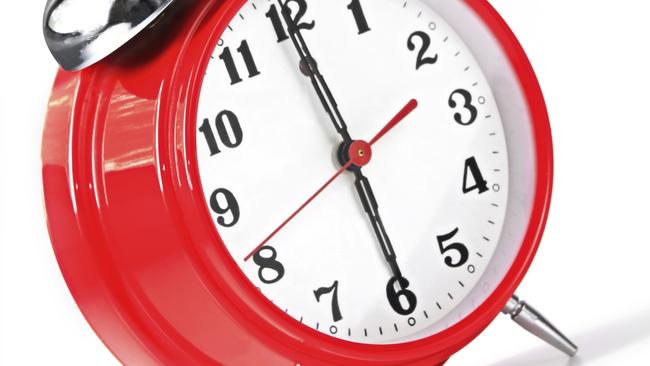Body clock ticks in synch when you stick to routine
Sticking to a regular routine will do more for the sleep-deprived than a nice long lie-in on the weekend.

Social jet lag: it’s the phenomenon that happens when weekday and weekend sleep schedules don’t match up, and the body’s internal clock gets out of synch with the environment.
The body’s master timekeeper resides in the hypothalamus, a section of the brain that produces hormones to help control different bodily functions. It’s set according to exposure to light and darkness, and when it gets out of synch with the 24-hour environmental clock the body gets confused, affecting the ebb and flow of hormones.
“When the rhythm is synched up appropriately, our bodies can anticipate what’s needed next and how to time it appropriately,” says Mary A. Carskadon, a sleep expert at Brown University in the US.
For most people, the clock runs slightly longer than 24 hours, but for about 20 per cent of the population colloquially known as morning people, it is a little shorter.
“If the clock is longer, you naturally tend to want the day to be longer,” says Kenneth P. Wright, director of the Sleep and Chronobiology Laboratory at the University of Colorado Boulder. “Clocks close to or shorter than 24 hours have an internal drive to go bed earlier and get up earlier.”
The amount of sleep the body needs is the same — about 7½ hours for adults and about nine for tweens and teens — but the clock tells the body when to sleep and wake, and each day it resets itself according to environmental prompts.
Darkness signals the biological clock to increase the flow of melatonin. In nocturnal animals, that is the cue to wake up. In humans and other diurnal creatures it is the cue to sleep. Light signals the biological clock to reduce the flow of melatonin, indicating a new day.
The problem for humans is that exposure to light is now driven by technology more than by nature. Circadian scientists, who study the biological clock, believe that artificial light leads to later bedtimes, and Wright tested the theory by taking eight healthy adults camping.
The participants wore actigraph sensors on their wrists for one week before the trip to measure their light exposure and sleep. “After that, they came into the laboratory so we could under controlled conditions assess the timing of their internal clocks,” Wright says.
With their baseline measurements recorded, the participants, still wearing actigraphs, went camping for a week and were deprived of artificial light. “We didn’t even allow flashlights,” Wright says. “There was sunlight, starlight and campfires.” Afterwards, the participants returned to the lab, where their internal clocks were reassessed.
“What was striking is that after camping, our biological night, when melatonin levels rise, nearly synched perfectly with sunset,” Wright says.
The participants’ melatonin levels rose about two hours earlier than in the modern environment and receded about an hour before waking. In the modern environment, melatonin levels didn’t drop to lower daytime levels until an hour or so after waking.
“The clock is still telling us that it is biologically night-time, and we should still be sleeping,” Wright says.
Altering the schedule on weekends adds to the confusion, and adolescents may have it worst of all. Their maturing biological clocks push them to remain awake a little later at night, and artificial light adds to the pressure — but they still need about nine hours of sleep, Carskadon says.
“School says you need to get up earlier but the body system says to stay up later,” she says. “What gets squeezed out in the middle is how much sleep time there is.”
There is a perception that the sleep-deprived can “catch up” on the weekend, but research from this year’s Sleep Meeting of the Associated Professional Sleep Societies disputes that.
The best bet, the researchers say, is to get the recommended amount of sleep and stick to the same schedule on weekdays and weekends.
Or to put it another way — with apologies to pop group DeBarge — to the beat of the rhythm of the night, sleep until the morning light.



To join the conversation, please log in. Don't have an account? Register
Join the conversation, you are commenting as Logout